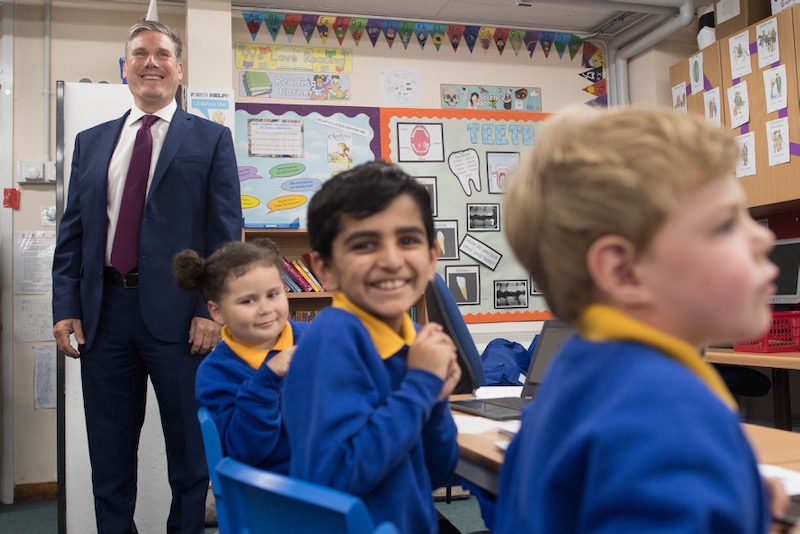The story of Jesus calming the storm in Mark's Gospel so often forms the paradigm of the running and leadership of a school. The dramatic flare up of the storm that brings about fear and trepidation is followed by a sense of calm, underpinned by the overarching authority of Jesus.
As the old teaching adage goes, “no one day is ever the same”, and so often we deal with storms, and various tests that are thrust upon us to overcome and to restore a sense of calm back into our schools.
I always like to picture the moments after the story has finished – the journey back to the shore, sorting the nets out and later sharing a meal together. I imagine that after the initial shock of what happened, the disciples talk among each other of their relief and the inner calmness that Jesus’ actions have brought to each of them.
The return of schools this half term conjures up a similar image to the post-storm calming that Jesus enacted. The first few weeks in September were pretty magical. Yes, we had new systems and regulations in place at the school, but the joy of seeing our students return to school for the first time since March was pretty special. You could feel it within the school; it emanated from everyone. The camaraderie returned immediately and although not spoken of, there was an overwhelming sense of relief among students. They were pleased as punch to be back.
The sense of purpose and focus in classrooms around the school has gathered momentum and hasn't relented. Students want to
be back and are delighted to have their teachers in front of them rather than on a screen. Parents too, have spoken of their relief that their son or daughter has returned to school and have acknowledged the pivotal role that school plays within the normal functioning of the family.
For teachers, at the end of this first half term, which is often one of the more challenging, it is can be hard to look back at the overwhelming positive things that have been achieved. Usually this is because teachers are so tired and drained and are coming to terms with the dramatic end of the “storm”. This year, for obvious reasons, the challenge has been far greater, but teachers up and down the country have risen to the challenge as they always do.
In August I wrote on these blog pages about the need to recapture the imagination of our young people in the classroom. Throughout the course of the last six weeks, that has been the underlying mantra of the staff at my school, putting, as they always do, the students first and teaching with a renewed energy and excitement. It has been fantastic to behold. Whilst there are restrictions in place, this hasn’t stopped extra-curricular activities, or even celebrating our feast day (albeit a week early due to half term and the potential extension of that break). Students have played together at lunchtime; games of football or champ, laughing and joking with one another. The reverberating noise of the playground has returned, the unmistakable sound that is the epitome of joy. It feels like children have become children again.
But this half term hasn’t been all plain sailing. There have been points where the seas have been rough, so to speak. It is at these times, that we have attempted to keep the school calm and deal with challenging situations in such a way that we don't panic others. As a headteacher you very quickly become used to making a multitude of decisions throughout the course of a single day – so much so that you get used to it and don’t even notice when you are doing so. However, the onslaught of running a school in the midst of rising Covid numbers has made that extremely difficult. The influx of emails from families highlighting symptoms, intent to get a test, receiving the news of a positive test has been an added increase in the layers of information that need to be discerned before crucial decisions can be made. For me, it has meant the need to stop, establish facts, contact the London Coronavirus Response Cell and then make about who should self-isolate. Whilst one works quickly in an attempt to make a decision, there is also a fundamental necessity to get the judgement right – the decision that a child has to self-isolate can have a resonating impact on a family as a whole, especially if their family are living on a low income, like so many of ours are.
As the first half term of this academic year draws to a close, we as teachers retreat to the shores and regroup, better experienced and equipped to head back out on to the stormy lake of Galillee in the next half term. What we can be sure of is that there are choppier waters ahead and the potential for an even greater storm. We will be ready.
Andrew O’Neill has been the Headteacher of All Saints Catholic College (formerly Sion-Manning Catholic Girls’ School) since 2016. Since that time, the school has gone from being on the brink of closure to become highly over-subscribed and developed a reputation for offering quality education.



 Loading ...
Loading ...
What do you think?
You can post as a subscriber user ...
User comments (0)